Boeing Hit To US Economy A Worry For Trump Reelection Bid

President Donald Trump is counting on a strong US economy to seal his reelection victory but the Boeing crisis and ongoing trade frictions could undermine that strategy.
Trump on Wednesday criticized Boeing as a "very disappointing company" because of the aerospace giant's recent problems after the worldwide grounding of the 737 MAX plane, which is having knock-on effects for the broader economy.
He also has lashed out at the Federal Reserve for mishandling monetary policy and keeping borrowing costs too high, which he says is likewise holding back the US economy.
Other scapegoats include Europe and China, which he says use trade policies to take advantage of or steal from the United States, and any country with a weak currency against the US dollar.
And as the impeachment trial against him proceeds in the Senate, Trump of course has blamed Democrats for a political attack that is distracting from his policy priorities.
However, no matter whom he chooses to cast as a culprit, the data show it is the trade wars Trump launched against multiple trading partners that are having the biggest effect, causing investment to screech to a halt amid widespread uncertainty.
Still, he is right about the potential damage from the travails at Boeing, which halted production of the top-selling 737 MAX aircraft after it was grounded following a pair of deadly crashes that killed 346 people.
Heading into the final months before the presidential elections in November, Trump has repeatedly taken credit for record stock exchange levels and cited his partial trade deal with China as proof of the success of his economic policies.
"Nobody has done so much as I've done," Trump said in an interview with Fox Business Network from the economic forum in Davos, Switzerland, where he also floated the possibility of a middle-class tax cut.
But economists warn the partial China trade agreement signed this month is a patch that eases only some of the uncertainty about new tariffs and leaves two-thirds of the products exchanged between the economic powers still subject to punitive duties.
And while in Davos Trump also renewed his attacks on the European Union, again threatening to strike back with crippling tariffs on imported cars.
Continued uncertainty over trade could drag US growth below 2.0 percent, according to many forecasts.
Analysts at Oxford Economics warn "conditions aren't yet in place for an industrial rebound," noting that consumer spending also softened at the end of 2019.
Boeing on Tuesday officially pushed back the time frame for the 737 MAX to return to the skies, until mid-2020, and Trump lamented that Boeing's woes have "had a tremendous impact" on the economy.
"You know when you talk about growth, it's so big that some people say it's more than a half a point of GDP. So Boeing -- big, big disappointment to me," Trump said in an interview on CNBC."
The aviation giant's newly-installed CEO David Calhoun acknowledged Boeing's importance to the US economy.
The "criticality to the country just speaks for itself," Calhoun said Wednesday in a call with reporters, his first public remarks and the first interaction with reporters by a Boeing executive since the start of the MAX crisis in March 2019.
"Everyone wants Boeing to succeed for the sake of the country and I understand that and I have it on my shoulders."
Oxford Economics last month projected that the MAX production shutdown could slash half a point off the US economy's annual growth rate in the first quarter of 2020 due to slower investments and exports.
And while Boeing has reassigned its own workers during the production halt, one key supplier -- Spirit AeroSystems -- laid off 2,800 employees this month.
Things could get worse if the stoppage drags on -- cutting 0.2 percentage points off growth for the full year, according to IHS Markit.
© Copyright AFP 2024. All rights reserved.





















